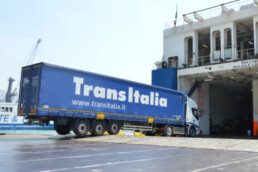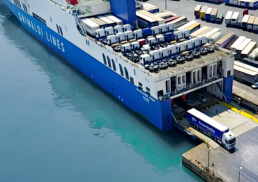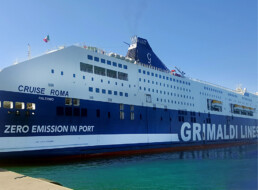Partner of Grimaldi Lines
We have worked alongside the Grimaldi Group for 25 years to promote short-sea shipping in Europe and its beneficial effects in economic, environmental and social terms.
The first "Zero Emissionin Port" ro-ro ships
The goods we transport travel on Grimaldi Lines Cargo’s new hybrid ships: they use an innovative engine and scrubbers to reduce sulphur emissions along the coast. While in port they are powered exclusively by electricity stored in lithium batteries recharged during navigation.
Partner of Grimaldi Lines
We have worked alongside the Grimaldi Group for 25 years to promote short-sea shipping in Europe and its beneficial effects in economic, environmental and social terms.
The first "Zero Emission in Port" ro-ro ship
The goods we transport will soon travel on Grimaldi Lines Cargo’s new hybrid ships, which will use an innovative engine and scrubbers to reduce sulphur emissions along the coast. When stopped in ports, they will be powered exclusively by electricity stored in lithium batteries that are recharged during navigation.
Working efficiently without damagingthe environment – it can be done.
A/R RO-RO routes
Italy

SalernoCatania - Palermo – CagliariLivorno - Genova - SaguntoTunisi - Malta - Bar
LivornoSalerno - Catania – PalermoCagliari – Olbia - BarcellonaValencia - Patrasso - TunisiTangeri - Malta
CivitavecchiaOlbia – Porto Torres - BarcellonaSagunto – Valencia - Tunisi
BrindisiCatania - Ravenna - CorfùPatrasso - Igoumenitsa
RavennaBari – Brindisi - CataniaIgoumenitsa – Patrasso - Malta
GenovaSalerno - Catania – CagliariPalermo - Taranto – Porto TorresPatrasso – Tunisi – Malta - Bar
SavonaBarcellona – Valencia – TangeriPatrasso - Bar
Porto TorresCivitavecchia - Genova- Barcellona
CagliariSalerno - Palermo – LivornoGenova - Sagunto
OlbiaLivorno
PalermoSalerno – Livorno - CagliariGenova - Valencia – Tunisi
CataniaSalerno - Genova – LivornoBrindisi – Ravenna - PatrassoValencia – Malta – Bar
VeneziaPatrasso – Corfù – Igoumenitsa - Bari
BariRavenna – Venezia - Patrasso
TarantoGenova - Bar
Spain

BarcellonaCivitavecchia - Livorno - Porto TorresSavona - Tangeri
ValenciaLivorno - Savona - CivitavecchiaPalermo - Catania
SaguntoSalerno - Civitavecchia - Cagliari
Greece

Patrasso Catania - Brindisi - RavennaLivorno - Genova - SavonaBrindisi - Venezia - Bari
IgoumenitsaRavenna - Brindisi - Venezia
CorfùBrindisi - Venezia
Montenegro

BarSalerno – Catania – GenovaSavona - Taranto
Marocco

TangeriLivorno - Savona - Barcellona
Tunisia

TunisiLivorno - CivitavecchiaSalerno - Palermo - Genova
Malta

La VallettaSalerno –Livorno – RavennaCatania – Genova
The changes for the environment
Maritime intermodality allows significantly reducingpolluting emissions during each journey compared to all-road transport.
Choosing the intermodal transport chain also means entrusting your goods to a widely tested management system that guarantees low load handling, greater safety and competitive costs.
INTERMODAL
service- Livorno - Valencia 644 kg CO2e
- Civitavecchia - Barcellona 505 kg CO2e
INTERMODAL
service- Barcellona – Savona 372 kg CO2e
- Livorno – Barcellona 459 kg CO2e
- Savona – Valencia 586 kg CO2e
INTERMODAL
service- Livorno - Valencia 644 kg CO2e
- Civitavecchia - Barcellona 505 kg CO2e
INTERMODAL
service- Barcellona – Savona 372 kg CO2e
- Livorno – Barcellona 459 kg CO2e
- Savona – Valencia 586 kg CO2e
The birth of the motorways of the sea
Back in the mid-1990s, in close collaboration with the shipowner Grimaldi, we inaugurated the first maritime intermodal connection, which connected Salerno to Barcelona on a weekly basis with a ro-ro ship.
Thus were born the “motorways of the sea”, only adopted by the European Community in Gothenburg in June 2001, with the aim of improving connections with peripheral regions and reducing carbon dioxide emissions into the atmosphere.




In the meantime, considerable investment in equipment and fixed assets, branches and subsidiaries in various European countries, and a direct presence in the main Italian ports have enabled the development of that articulated network of maritime intermodal connections which, with fast, reliable and low-cost services, has allowed central-southern companies to enter the distant markets previously closed to them.
In the meantime, considerable investment in equipment and fixed assets, branches and subsidiaries in various European countries, and a direct presence in the main Italian ports have enabled the development of that articulated network of maritime intermodal connections which, with fast, reliable and low-cost services, has allowed central-southern companies to enter the distant markets previously closed to them.






